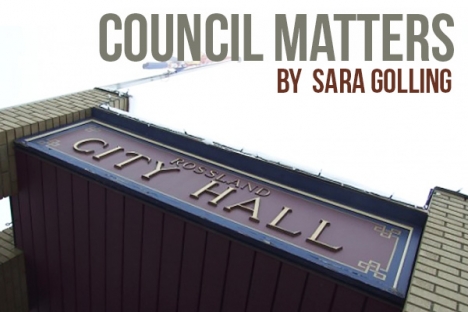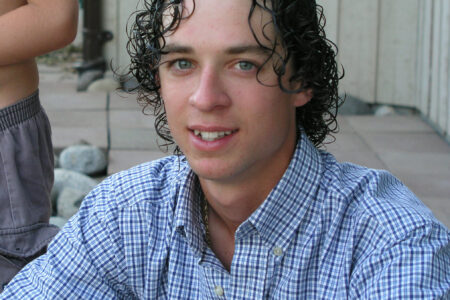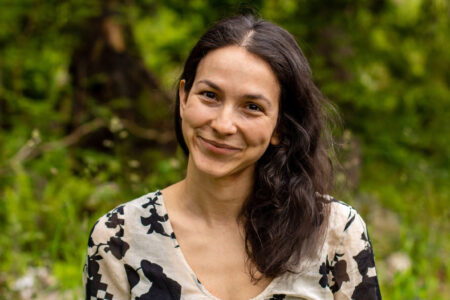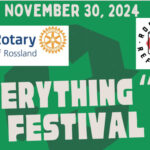Council challenged, answers questions, passes replacement motions
Rossland City Council held a Special Meeting on Tuesday, May 11, by Zoom, at 11:00 am; all members were present. The meeting was needed to rescind and replace the previous Council motions, unanimously approved on April 19, 2021, awarding the tender for the Mid-Town Mixed-use project, because of a ‘transcription error” from the original tender.
At Public Input Period, resident Paul Evans identified himself as representing the new “Rossland Ratepayers Association” and asked several questions.
Evans wanted to know why the meeting was being held at 11:00 in the morning, when most residents might be unable to attend; Mayor Kathy Moore explained that the new information came out only recently, and there is urgency to getting the motions updated, discussed and decided, and that 11:00 am was when all Council members were available. (Councillor Stewart Spooner participated by phone from his workplace in the forest, and trees were visible in the background.)
Evans also asked “Why is the project going ahead during COVID, when the City is financially stressed?” Moore explained that the project will provide employment when many people need it, and that the project “is not stressing the City financially.” Councillor Andy Morel added that the construction industry is approved to work during the pandemic, and that the City has been assured that all protocols will be followed.
Evans asked why the City has consistently refused to put the project to a referendum. Moore answered that Council is elected to make decisions like this on behalf of the City, that the City needs additional housing and that the complexity and depth of the information to be considered for this project does not lend itself to a referendum for decision-making. Councillor Dirk Lewis added that there are projects for which a referendum is better suited, such as whether or not residents want a new swimming pool and are willing to take on the cost of it; but for this development a referendum wouldn’t serve the City’s needs.
Resident and former Council member Andrew Zwicker said he was curious about how much the ground floor space of the development would have to be rented for, to be worthwhile; “what will the square foot cost be, to occupy the ground floor?” Neither Staff nor Council member had the figures available at the time, but when Evans asked if the City could make the figures public, Spooner responded that “the figures are all in the public realm,” and noted that there is a report that sums things up.
Spooner also said he thought Zwicker’s focus was too narrow, and that overall, this project is “clearly the most advantageous over the long term.”
Moore gave permission for Evans to ask more questions, and he wanted to know why the City had not used the insurance money to refurbish the old City Hall building; Moore explained that the City had outgrown that building even before the roof beam collapsed.
Evans asked why housing couldn’t go on the ground floor of the Mid-Town project as well; Moore reminded him that the ground floor is not approved for residences because of the site being an old “brownfield,” but it is approved for office space.
Evans floated the idea of a “campus” concept for City Hall, with different functions in different locations around the city; Councillors shook their heads, and Moore explained that residents need to have City Hall in one location so they know where to go.
Spooner added, “People are missing the essential point here. Over time, this project will make money for the City. It will be a net positive to the community. If you understand all the parts, it’s like a no-brainer.”
As to the cost, he noted that it sounds like a lot of money, but much of it is covered by grants. Both CAO Bryan Teasdale and Councillor Chris Bowman noted that the City is paying high rent in its current premises. Teasdale commented that the area of the new premises will be larger, and that the City needs the additional space, so the operating costs will likely be higher, but not much higher because there will be other efficiencies that the old building lacked.
Council then turned to the business of the day, which required new motions because of (wording direct from the Council materials:)
1. An error in the transposition of the construction cost information provided by Yellowridge.
2. An increase in the interest rates for financing provided by BC Housing from 2.9% to 3.3%.
3. Property Transfer Tax for an estimated amount of $155,000 for the units to be acquired by the Provincial Rental Housing Corporation (PRHC) through a long-term lease. Due to the approved project schedule (project start-up meeting May 11 and expected project commencement date of May 18), this report is being advanced to Council in short order to ensure all pricing remains intact and continue with the project’s timeline.
Three motions to rescind the three motions that had been unanimously approved at the April 19 meeting all CARRIED unanimously.
Council then considered the new motions. The first, a motion to “approve the overall capital budget (including land) for the construction of the Rossland Midtown Mixed-Use Development Project (1920 Third Avenue) in the amount of $16,063,433, exclusive of applicable taxes, and subject to Final Project Approval (FPA) from BC Housing,” CARRIED unanimously.
The second motion was to “ approve the portion of costs in the overall capital budget, which includes both the shell space and tenant improvement costs for the City Hall portion of the overall project, in the amount of $3,369,442 (including land), but exclusive of applicable taxes,” CARRIED unanimously.
The third motion, to authorize the Lower Columbia Affordable Housing Society (LCAHS) “to enter into the CCDC-5B contract through the amending Article A-8 Contract Price with Yellowridge Construction for the full scope of work, including related City Hall costs and improvements, in the amount of $12,693,991, exclusive of applicable taxes, and subject to Final Project Approval (FPA) from BC Housing,” also CARRIED unanimously.
The meeting adjourned, and your reporter rushed out to plant her tomatoes and a few other things in a little greenhouse, which took a surprisingly long time and more energy than expected, and is why this report wasn’t published immediately. Priorities!

























